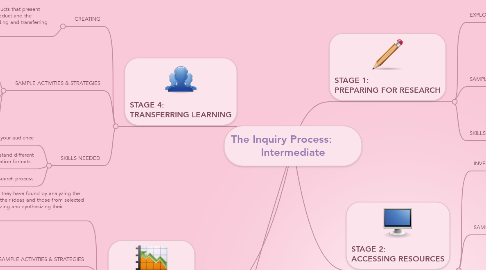
1. STAGE 4: TRANSFERRING LEARNING
1.1. CREATING
1.1.1. "Students create knowledge by making products that present the results of their inquiry, assessing their product and the process they used to construct it, and extending and transferring their learning to new contexts and inquiries."
1.2. SAMPLE ACTIVITIES & STRATEGIES
1.2.1. "Use the most appropriate method to support and present findings while honouring the learner’s choice (e.g. visual, oral, performance, written, multimedia, digital)."
1.2.2. "Offer opportunities to examine questions for future inquiry (e.g. journaling, online time capsule, role on the wall).'
1.2.3. "Reflect on knowledge gained and the learning journey."
1.3. SKILLS NEEDED
1.3.1. - Know your audience
1.3.2. - Understand different presentation formats
1.3.3. Reflect and Evaluate research process
2. STAGE 3: PROCESSING
2.1. "Students process what they have found by analyzing the information, evaluating their ideas and those from selected information, and organizing and synthesizing their findings."
2.1.1. Apple, Ireland
2.1.2. Internal Communications Manager
2.1.3. Responsibilities
2.1.3.1. Setting up an intranet for the business unit
2.1.3.2. Communication Management
2.1.3.3. Publishing monthly newsletters
2.2. SAMPLE ACTIVITIES & STRATEGIES
2.2.1. "Summarize information found in a variety of ways (e.g., sequential storyline, illustration, timeline, video clip) or use an appropriate visual organizer to jot notes to clarify understanding"
2.2.2. "Use graphic organizers (e.g. T-chart, Venn diagram, information map) to compare information, according to content or validity (i.e. purpose, relevance, accuracy, bias, currency, and authority)."
2.3. SKILLS NEEDED
2.3.1. - Analyze and evaluate information using a variety of strategies
2.3.2. - Sort out information using a variety of organizers
2.3.3. - Formulate conclusions
3. RESOURCES
3.1. Together for Learning: School Libraries and the Emergence of the Learning Commons: A Vision for the 21st Century" © 2010 Ontario Library Association. ISBN 978-0-88969-056-1
3.2. Ontario School Library Association to view the Information Studies K - 12 ://www.accessola.com/action/positions/info_studies/
4. STAGE 1: PREPARING FOR RESEARCH
4.1. EXPLORING
4.1.1. "Students explore by initiating the inquiry, choosing an appropriate and personally engaging topic, and developing deep questions around the topic chosen."
4.1.1.1. Mother tongue
4.2. SAMPLE ACTIVITIES & STRATEGIES
4.2.1. "Brainstorm possible questions for the inquiry and topic chosen, and classify the questions according to type."
4.2.1.1. MS Office
4.2.1.1.1. Excellent
4.2.2. "Explore multimedia on the topic and summarize issues raised prior to choosing a topic for inquiry."
4.2.2.1. Windows
4.2.2.2. Mac
4.2.3. "Develop a physical or virtual space to build the inquiry (e.g. interactive bulletin board, blog, wiki)."
4.2.3.1. HTML
4.2.3.2. CSS
4.2.3.3. Javascipt
4.3. SKILLS NEEDED
4.3.1. - Formulating Questions
5. STAGE 2: ACCESSING RESOURCES
5.1. INVESTIGATING
5.1.1. "Students investigate their topic by designing a plan for inquiry, finding sources and selecting appropriate information, and formulating a clear and interesting focus."
5.2. SAMPLE ACTIVITIES & STRATEGIES
5.2.1. "Browse the school library collection and search online catalogues for relevant sources and record information."
5.2.2. "Employ various skim/scan techniques that match the resource used."
5.2.3. "Make use of “virtual field trips” in addition to actual excursions to enlarge the scope of the inquiry."
5.3. SKILLS NEEDED
5.3.1. - Evaluating usefulness of resource
5.3.2. - Online searching
5.3.3. - Determining whether information is relevant or not
